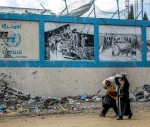You are here
As US pulls out of Afghanistan it leaves a country in tatters
Apr 20,2021 - Last updated at Apr 20,2021
The United States is finally leaving Afghanistan 20 years after it invaded that country in a bid to destroy Al Qaeda, and its host the Taliban, to avenge the victims of 9/11. Last week President Joe Biden set the symbolic date of 11 September 2021 as the last day for American troops to pull out from that country, which lived up to its historical legacy as the graveyard of empires.
Initially president Donald Trump had set 1 May of this year as the day that concludes US withdrawal. That was part of the Doha negotiations process involving the US, the Afghan government and the Taliban. That process, which started a year ago, is yet to deliver reconciliation between the Kabul government and the Taliban group. The Taliban is not keen on adopting the 2004 constitution and on sharing power with a freely elected government. Biden’s decision to withdraw will embolden the Taliban and will leave the government with fewer cards to bargain with.
The US wants commitments from the Taliban not to turn the country into a terrorist hub. This is far from the initial goal of the US intervention which later included nation building and turning Afghanistan into a western-style democracy. The US may leave behind advisers on counterterrorism to help the Kabul government, but even then it is largely believed that the Taliban will pounce on the opportunity to take over most of the south and east within a few months after the September withdrawal. The fall of Kabul is likely to take more time since the so-called Northern Alliance of Tajik, Hazara, and Uzbek tribes are expected to defend the city. After that there will be a stalemate as tribes will delineate their ancestral territories. That could drag the country into a prolonged civil war and bring more chaos and bloodshed.
Pundits will ponder the question: Who lost the war and who won it? The US had sent thousands of troops, built military bases, trained the Afghan army and bombed, many times indiscriminately, towns and villages resulting in civilian deaths and injuries. At times the US administrations of Bush Jr. and Obama opted to send more troops and increase the rate of drone strikes in order to repulse the Taliban. That worked for a while, but as the troop drawdown began in 2017, the Taliban regrouped and waged campaigns that allowed them to recapture new territories.
The lessons of Vietnam had been forgotten. The US invaded two countries between 2001 and 2003 hoping to contain rogue regimes and impose western style democracies. It misjudged on all accounts. Its military, the largest and most sophisticated in the world, had failed to defeat the Taliban and was finally forced to sit and negotiate with an obstinate enemy that is ideologically committed to impose an Islamist emirate. In Iraq it faces a myriad of challenges including a bolstered Iran that has become a menacing regional power.
At one point the US will be forced to rethink its presence in Iraq as well; a country that is bedeviled by the curses of sectarianism, mass corruption and foreign meddling. By 2017 the US had spent $2.4 trillion on its military adventures in Iraq and Afghanistan. In both wars the US intervention had exacerbated the conflicts leading to tens of thousands of innocent civilian deaths, destruction of cultural heritage, deepening of tribal rivalries, the rise of militias and rampant official corruption. The nation-building experiment had failed just as the regime change approach never worked. In both cases America’s incursions had opened a proverbial Pandora’s box. The US departure from Afghanistan and later from Iraq will leave both countries in turmoil—many will say in a worse condition than before the invasions.
But nations and leaders often fail to absorb history’s lessons. Today Russia is massing troops along its borders with the Ukraine. Syria’s endless civil war is fuelled by the military intervention of Russia, US, Turkey, Iran and Tehran proxies. Libya’s attempt to unite and heal its wounds is hampered by the intervention of Turkey and Russian military contractors.
Military interventions had rarely delivered on their initial objectives. The memory of an abandoned and later looted US embassy in Saigon, South Vietnam, in 1975 may well be repeated in Kabul and Baghdad. In both cases the US had failed, but while its departure may bring relief to war weary Americans, the conflicts it leaves behind will continue for many years to come.
Osama Al Sharif is a journalist and political commentator based in Amman.













